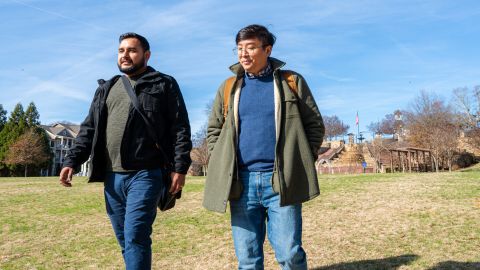JOHN YANG: In 2021, as they do every 10 years, each state redraw its congressional district lines to reflect the results of the 2020 census.
Now, two years later, the maps and more than a half dozen states are the subject of lawsuits from voting rights advocates, who say they dilute the voting power of black and Latino voters.
Last week a federal judge throughout Georgia's new district map and ordered the Republican controlled state legislature to try again.
In Alabama, federal court has rejected two maps devised by state lawmakers and appointed an expert to draw a new one.
Louisiana's redistricting is up in the air after the Supreme Court declined to speed up the redrawing of district lines to replace a map thrown out by a federal judge.
And last month the Supreme Court heard arguments about South Carolina's redistricting plan.
And now a ProPublica investigation highlights how some state legislatures are trying to shield the data lawmakers used to draw the maps data the courts say they need to judge whether the lines are discriminatory.
ProPublica reporter Marilyn Thompson wrote the story.
Marilyn, summarize quickly what you found and why it's significant.
MARILYN THOMPSON, ProPublica: Well, my story tried to look at what has happened in states where discrimination has been found.
And yet the process drags on so long, that minority voters who've been deprived of their rightful vote are left to vote under discriminatory maps.
And that happened to some effect, as you know, in 2021, because of these pending lawsuits, and now it's about to happen again with the same lawsuits that are dragging on indefinitely.
I wanted to find out why that's happening.
And a source along the way, told me you need to look at the issue of legislative privilege and the use of privilege to try to block the public from knowing what's going on in the redistricting.
JOHN YANG: What is legislative privilege?
MARILYN THOMPSON: Legislative privilege is a very old concept.
It's embedded in the U.S. Constitution and in the constitution of many states that basically holds that the legislature's work, needs to be private, in order to allow them to do the business of the public.
And that only in exceptional circumstances will the legislature have to reveal what it what it does.
Redistricting is interesting, because it's one of those circumstances in which the plaintiffs minority -- largely minority groups have to prove that there was deliberate legislative intent to draw lines a certain way.
Therefore, in order to prove intent, you got to see the evidence, and without the evidence, you got nothing.
JOHN YANG: Are judges accepting this?
MARILYN THOMPSON It varies, John.
It's quite interesting.
It sort of depends on the luck of the draw, like which judge you get, which three judge panel you get.
In the South Carolina case, for example, the judges basically rejected a lot of the privilege claims and what came out of that was, you know, a lot of inside shocking information about how the discussions went behind the veil.
Other judges are very firmly in the camp that we legislative privilege is a sacred right and they will not allow.
JOHN YANG: A lot of states are doing this, but it seems like it's spreading.
Where does this idea come from?
Does it just spring up in the minds of lawmakers?
MARILYN THOMPSON: It appears to be a very coordinated legal strategy.
We did not pinpoint one specific person who's promoting it.
But we certainly were able to see that the National Republican redistricting trust, which has been advising Republican states around the country on their redistricting battles, they played a major role in laying the groundwork for potential lawsuits, and what to do.
And then in the Texas case, which I examined at length, one of the key operatives from the Republican redistricting agency basically became a state employee in Texas and everything that he did they later claimed privilege to try to protect.
JOHN YANG: A lot of the examples you decide are Republican legislators doing this, are Democrats doing this anywhere?
MARILYN THOMPSON: Democrats are doing it.
Perhaps not as effectively in some cases.
I've been looking at Washington State, for example, which is Democratic controlled, and there has been an ongoing privilege fight there over the release of some redistricting records that plaintiffs say they need.
So it's not limited to one party.
But what I found and looking at redistricting more broadly, is that Republicans who have really had a sophisticated redistricting strategy, dating back to Lee Atwater, my old friend from South Carolina, they know what they're doing.
And they have been very effective at advising states, and leading the way on how to counter what they have described as your inconsistent, irrelevant democratic lawsuits.
JOHN YANG: You begin and end your story with a woman named Eva Binya (ph).
Tell us about her why her story is significant.
MARILYN THOMPSON: Well, she is one of the unnamed plaintiffs in the Texas lawsuit.
She's a wonderful woman, very active in the Fort Worth democratic women's groups, dedicated Hispanic activist, and she's been watching Hispanics get the short end of the stick in Texas and voting rights issues for many, many decades.
And she's finally but, you know, she was so fed up with it, and feel that her community is so deprived of its voice that she joined in on this lawsuit, and I found her as a result of that there are real victims in these redistricting cases.
JOHN YANG: Marilyn Thompson of ProPublica, thank you very much.
MARILYN THOMPSON: Thank you John.
It's a pleasure.



